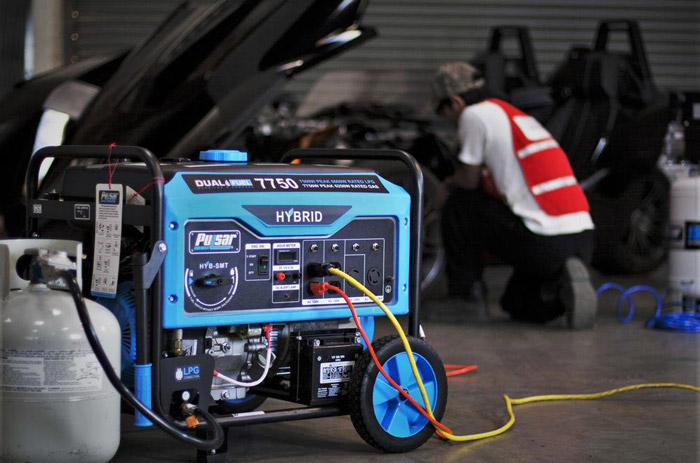 As we well know, sump pumps are installed in the basement where flooding happens regularly, or there is a probability of flooding occurring. Sump pumps are used to solve dampness and prevent damages. With a sump pump, it gets easier to get rid of the water away from your home. Mostly, sump pumps are installed inside a specially designed sump pit where the flooding water rests.
As we well know, sump pumps are installed in the basement where flooding happens regularly, or there is a probability of flooding occurring. Sump pumps are used to solve dampness and prevent damages. With a sump pump, it gets easier to get rid of the water away from your home. Mostly, sump pumps are installed inside a specially designed sump pit where the flooding water rests.
Contents
What Size Generator to Run Sump Pump for 2021?
When the basement is flooded, the water flows inside the sump pit through natural gravity, water mitigation, or through drains. When the water reaches a certain level, the pump gets activated and starts getting rid of the water. It has proven to come in handy during emergency flooding, and it’s a must if you leave in a place where flooding occurs frequently.
Why Buy a Sump Pump Generator
During a power blackout or power outage, a lot can go wrong from food going bad, the darkness in the house, and worst of all, flooding in your basement. A generator is an essential handy machine that you need in your home, and getting one specialized for the sump pump can come in handy in case the electricity fails you. The sump pump needs to be operational at all times, and a sump pump generator will ensure it has the power required for running it.
The generator has to be reliable and also low-maintenance since you might not even get time to check it out when there is a power blackout. Another thing, a generator ideal for running a sump pump must give enough power to run the unit.
How to Determine the Size of a Generator to Run Sump Pump
Determining the size of a generator to run a sump pump is dependent on two or three factors. The factors will help you decide if the generator is right for your needs and those of your sump pump. They will also help you select the best model that delivers enough, reliable, and low-maintenance power.
Here are the factors to consider while sizing your generator for a sump pump.
1) Power rating
The power rating of the generator and your sump pump are crucial in determining the capacity of a generator to purchase. It would be best if you read the electrical rating tag of the sump pump, found at its back. Here there will be an electrical rating data that includes the pump horsepower, voltage, frequency, and amperage. The most important are the horsepower, voltage, and amperage.
Once you have the data, you can do an estimate by calculating the wattage needed by the sump pump. In simple estimation, you need to multiply voltage with amperage to get the continuous power supply required. However, you ought to remember that a sump pump needs both starting and running watts.
2) Generator Applications
You might be searching for a generator to run the sump pump explicitly. But considering a generator is an expensive investment, you might want to add other appliances to the generator load. With that, you will need to do an estimate of all the tools you want to run and sum up together with the sump pump power requirement. That way, you have a view of the amount of power you will be drawing from a generator, and it will be easier to size it right.
3) Number of sump pumps to run
How many sump pumps do you have? One, two, or more? If you have more than one sump pump, you need to consider the ratings of each model, especially if you have different types of sump pumps. In this case, you have to do an estimation of each model and sum it up. But if you have one-type sump pumps, you can find the power needed by one and multiply with the number of sump pumps you have.
What Size Generator to Run Sump Pump
As you have noticed, sizing the best sump pump generator is quite simple. Now that we know what to consider while sizing, it’s time we get to serious business of sizing the generator. As I mentioned above, you will have to find the wattage demand of the sump pump and find a generator that supplies this power.
The higher the sump pump horsepower, the more significant the generator will need to be. For instance, a 0.75-horsepower sump pump needs an average of 1300 starting watts and an average of 800 running watts. And for a 0.5-horsepower sump pump, expect about 2150-starting watts and 1050 running watts.
With the two wattage rate numbers, it translates to a reasonably large portable generator. It would be best if you found a generator that supplies enough power to start and keep the sump pump running and also leave a little wiggle room of some extra wattage available. That ensures the generator never runs at maximum power all the time, as that might cause unnecessary wear to your investment, which might lead to premature damage.
According to simple physics math of electrical conversion, 1-Horsepower is approximately 750watts of power. And for the load characteristics and the wattage allowance, you might want 1.5 or double that power requirement. That means 1500 running watts are enough for a 1-HP sump pump.
You might want to get a more significant generator if you plan to use the same unit for the lights or if you’re going to make a cup of soup or tea also if the extension cables are long and with heavy conductors.
Typically, for a 16 gauge extension cord that is less than 50 feet long is capable of powering a 1625 watt appliance and a 16 gauge cord longer than 50-feet in length is capable of powering a device of up to 1250W only. That means, while sizing your generator, you also have to consider the wire-gauge you’re using.
How to Connect a Sump Pump Generator
While setting up the generator, you have to ensure the setup spot is away from the windows and doors, and at a convenient distance from the sump pump. Also, make sure it’s in an open place where it cannot be rained on or a place where flooding can never occur.
Another thing, while installing the generator, you need to make sure that you have the right wire gauge and the correct connecting tool.
The connection is best if done by a qualified electrician to prevent the wrong link. But if you know how to do the job, then you can try it out.
Caution: Wrong connection might lead to sump pump damage or worse get yourself electrocuted.
Conclusion
And there you have it; everything you need to know while sizing your generator for a sump pump. It’s as simple as shown above. Nothing should give you headaches again. If you buy the right model with the perfect power supply, you can stay stress-free knowing you’re are well covered during the next blackout or power outage.
Read More:

